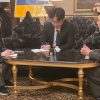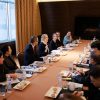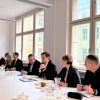The main security challenges for Ukraine are expansion of the conflict escalation zone in the East and the victory of the pro-Russian forces in the 2019 parliamentary elections in Ukraine. Leo Litra, Senior Analyst at the NEC, emphasized this during his speech at the Eastern Partnership Think Tank Forum 2018 that took place in Bucharest, between 14-16 of November.
Leo Litra pointed out several trends in the security environment in Ukraine.
“First of all I would like to underline the trend of increasing of group of so-called “neutralists”. In 2014 in Ukraine we had 22% of “neutral” people who don’t opt any geopolitical integration project (EU or Eurasian Economic Union). In 2018 this number increase to 33%,” Mr. Litra said.
“Second moment that I would to outline is the Transatlantic unity. One example that dividing the Transatlantic unity is the Nord Stream 2 gas pipeline project. This project somehow facilitate by some EU companies and not welcome by the US. Ukraine would like if the US impose sanctions against Nord Stream 2 project, but Kyiv cannot say this because it will spoil Ukraine relations with Germany and others EU countries that involve in Nord Stream 2 project,” Mr. Litra emphasized.
He also drew attention to Russia’s intentions to influence the upcoming elections in Ukraine:
“The most important issue in Ukraine is next presidential and parliamentary 2019 elections. We see attends from Russian side to mobilize their supporters in Ukraine. Officially, in Ukraine we have about 15% supporters of Russian-led projects. In my opinion, this is not really number because many of “neutralists” may consider to be pro-Russian: now they are not eager to declare own sympathy to Russia. At this moment, I don’t think that pro-Russian candidate get the presidency in Ukraine, but it will good exercise to parliamentary elections. If pro-Russian politicians manage to get one third of mandates in Ukrainian parliament, it would mean that Russia will get serious force to block some initiatives”.
“In trends of real military threats I would like to underline that escalation in the Donbas will be at least until the elections in Ukraine. We see new areas of escalation in such locations like the Azov Sea,” Mr. Litra added.
In addition, Leo Litra addressed the issue of Ukraine-EU relations:
“The EU has very wide and complex relations with Ukraine. I think that what Ukraine achieved in last 4 years it did not achieved for last 23 years: Association Agreement, visa-free, cooperation in many-many areas. Also good news coming from trade: 40.5% of Ukrainian exports are going to the EU and about 9.1% to Russia. Russia still the biggest trade partner of Ukraine, but it going to change”.
“The EU provide a lot of support for adoption an anticorruption legislation in Ukraine. Corruption is a source of a weakness of Ukraine, but I think that Russia is a biggest threat for Ukraine,” Mr. Litra added.
Sergiy Solodkyy, First Deputy Director of the NEC, also participated at the Eastern Partnership Think Tank Forum 2018. He moderated the panel on security threats to the Republic of Moldova.
“Moldovan analysts said that Moldova may become the next victim of Russian aggression after Ukraine. At the same time, some in Ukraine are talking about Moldovan scenario threats – so called “dodonization” (the risk of coming of pro-Russian forces to power). Similar forums allow not only to adopt each other’s experience, but also to think about ways of cooperation to counter common threats,” Mr. Solodkyy said.
Eastern Partnership Think Tank Forum 2018 was organized by the New Europe Center together with the Experts for Security and Global Affairs (Bucharest), the Institute for European Policies and Reforms (Chisinau) and the Georgian Institute for Strategic Studies (Tbilsi).
Over 25 top notch experts from both Eastern Partnership Countries and the European Union together with almost 100 participants was gather in the second edition of the Eastern Partnership Think Tank Forum. The event addressed the current challenges and future perspectives of the European Unions Eastern Partnership policy.
Video of the forum.
Part 1:
Part 2:
Part 3:
Part 4:
The project benefits from support through the EaP Civil Society Forum 2018 Re-granting/Financial Support to Third Parties (FSTP) Scheme and is funded by the European Union as part of its support to civil society in the region. Within its Re-granting/FSTP Scheme, the Eastern Partnership Civil Society Forum supports projects of its members that contribute to achieving the mission and objectives of the Forum.









